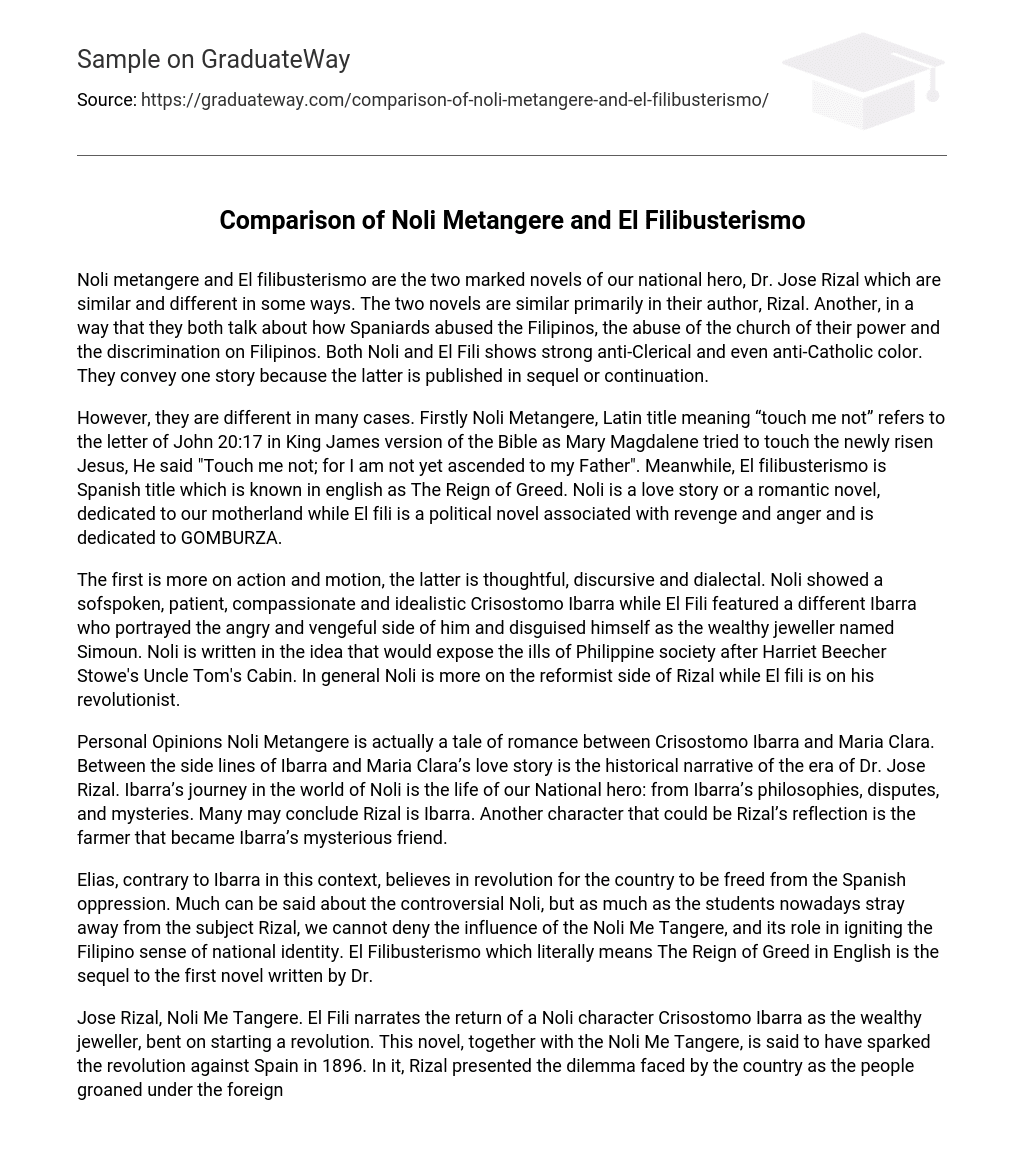Noli metangere and El filibusterismo are the two marked novels of our national hero, Dr. Jose Rizal which are similar and different in some ways. The two novels are similar primarily in their author, Rizal. Another, in a way that they both talk about how Spaniards abused the Filipinos, the abuse of the church of their power and the discrimination on Filipinos. Both Noli and El Fili shows strong anti-Clerical and even anti-Catholic color. They convey one story because the latter is published in sequel or continuation.
However, they are different in many cases. Firstly Noli Metangere, Latin title meaning “touch me not” refers to the letter of John 20:17 in King James version of the Bible as Mary Magdalene tried to touch the newly risen Jesus, He said “Touch me not; for I am not yet ascended to my Father”. Meanwhile, El filibusterismo is Spanish title which is known in english as The Reign of Greed. Noli is a love story or a romantic novel, dedicated to our motherland while El fili is a political novel associated with revenge and anger and is dedicated to GOMBURZA.
The first is more on action and motion, the latter is thoughtful, discursive and dialectal. Noli showed a sofspoken, patient, compassionate and idealistic Crisostomo Ibarra while El Fili featured a different Ibarra who portrayed the angry and vengeful side of him and disguised himself as the wealthy jeweller named Simoun. Noli is written in the idea that would expose the ills of Philippine society after Harriet Beecher Stowe’s Uncle Tom’s Cabin. In general Noli is more on the reformist side of Rizal while El fili is on his revolutionist.
Personal Opinions Noli Metangere is actually a tale of romance between Crisostomo Ibarra and Maria Clara. Between the side lines of Ibarra and Maria Clara’s love story is the historical narrative of the era of Dr. Jose Rizal. Ibarra’s journey in the world of Noli is the life of our National hero: from Ibarra’s philosophies, disputes, and mysteries. Many may conclude Rizal is Ibarra. Another character that could be Rizal’s reflection is the farmer that became Ibarra’s mysterious friend.
Elias, contrary to Ibarra in this context, believes in revolution for the country to be freed from the Spanish oppression. Much can be said about the controversial Noli, but as much as the students nowadays stray away from the subject Rizal, we cannot deny the influence of the Noli Me Tangere, and its role in igniting the Filipino sense of national identity. El Filibusterismo which literally means The Reign of Greed in English is the sequel to the first novel written by Dr.
Jose Rizal, Noli Me Tangere. El Fili narrates the return of a Noli character Crisostomo Ibarra as the wealthy jeweller, bent on starting a revolution. This novel, together with the Noli Me Tangere, is said to have sparked the revolution against Spain in 1896. In it, Rizal presented the dilemma faced by the country as the people groaned under the foreign oppressor: to revolt would only lead to a change of masters, while to do nothing would keep the nation enslaved for generations.
Rizal proposes a better way, through Father Florentino as he speaks to the dying Simoun: educate the natives, and when they shall have reached that stage where they would be willing to die for their principles, God Himself will supply the weapon, and “liberty will shine, like the first dawn. ” As gospels of Philippine nationalism, Rizal’s novels convey the essence of his nationalism that was to reverberate in the hearts of the people.
He identified this essence in his letters as his aspiration to alleviate the sufferings of the masses, to make men worthy, to avenge one day the many victims of cruelty and injustice, to erect a monument to the native tongue and to educate his people. In the two novels, the essence of Rizal’s nationalism is best understood through the keen study of the characters. Through their dialogue and actions, in their ideas and ideals, or in the lack of these are seen Rizal’s range of vision, his concept of love of country, his appeal for reforms, his attitude towards the friars, and his views on the weaknesses of the Filipinos.





